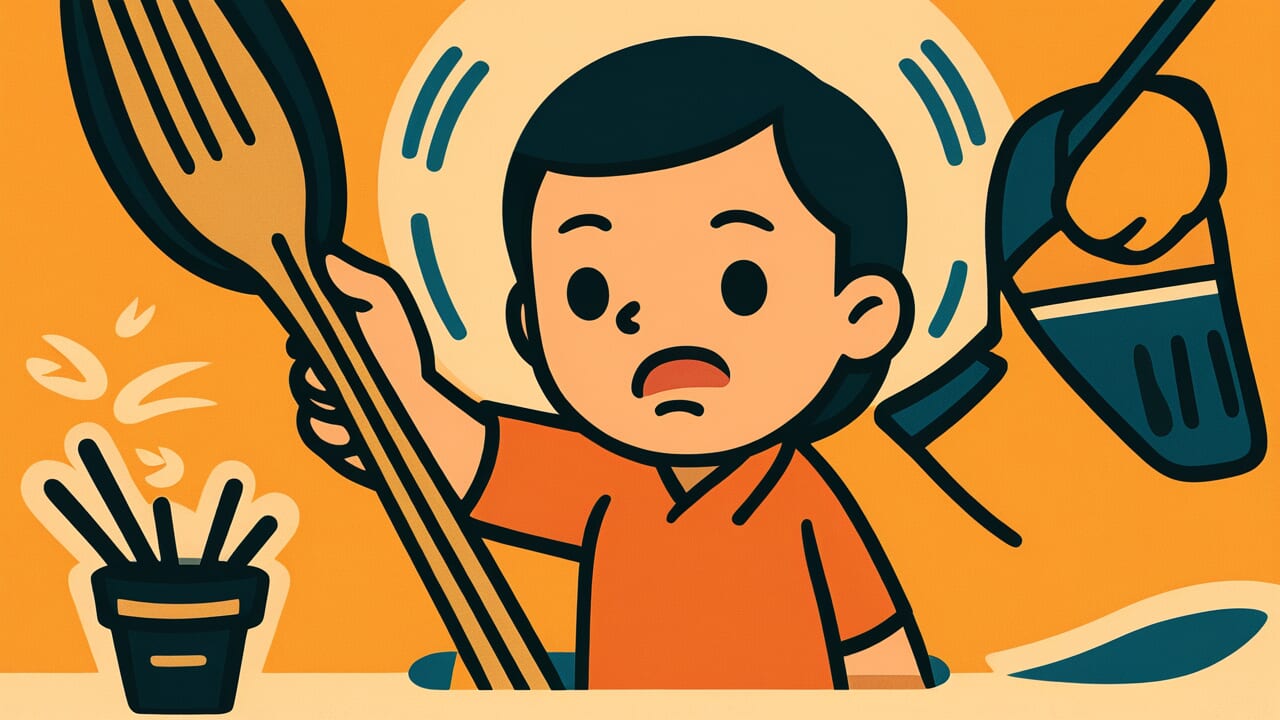How to Read “Lose the spoon and chopsticks”
Hishaku wo ushinau
Meaning of “Lose the spoon and chopsticks”
“Lose the spoon and chopsticks” is a proverb that describes being so shocked that you drop your spoon or chopsticks. It refers to a state where you receive such a jolt that you accidentally drop the eating utensils you use every day.
This proverb is used to express your reaction when you hear unexpected news or witness something surprising. When people feel strong shock, they sometimes drop what they’re holding or freeze in place.
It expresses the disturbance so severe that you can’t perform unconscious actions during an everyday moment like eating.
Even today, everyone has experienced moments like these. You hear unexpected news and stand there stunned. You see something unbelievable and freeze completely.
This proverb captures such natural human reactions in a concrete and understandable way. The beauty of this expression lies in how it shows the degree of surprise not through exaggeration, but through a small everyday failure.
Origin and Etymology
The character “匕” in “Lose the spoon and chopsticks” originally means “spoon” in Chinese characters. This character is a pictograph representing the shape of a spoon with a handle.
Meanwhile, “箸” naturally refers to chopsticks used for eating.
Clear documentary records about the origin of this proverb are limited. However, considering the structure of the phrase, it likely focuses on the situation of dropping tools you’re completely familiar with using.
Spoons and chopsticks are tools we handle at every meal. We’ve used them since childhood, handling them with movements ingrained in our bodies. Under normal circumstances, dropping them would be impossible.
How much surprise or disturbance would it take to drop such familiar tools? Your hands tremble, lose strength, or your consciousness flies elsewhere.
The cleverness of this proverb lies in expressing such an abnormal psychological state through a trivial everyday failure.
Similar expressions appear in Chinese classics, suggesting this proverb may have taken root in Japan under the influence of Chinese literature. The wisdom of expressing the degree of surprise through everyday actions everyone understands has been passed down through generations across time.
Usage Examples
- I was so shocked hearing the sudden news of death that I lost the spoon and chopsticks
- I never expected him to win, so I stared at the results with the feeling of losing the spoon and chopsticks
Universal Wisdom
What the proverb “Lose the spoon and chopsticks” speaks to us about is the deep connection between the human mind and body. We normally perform various actions without conscious thought.
Holding chopsticks, walking, breathing. These are automatic movements our bodies have memorized. However, when strong emotions shake our hearts, that autopilot suddenly stops.
This proverb has been passed down for so long because it brilliantly captures the essence of surprise. Surprise is the mental disturbance created by the gap between prediction and reality.
That disturbance makes you lose words, stops your thinking, and even takes away control of your body. Within the small phenomenon of chopsticks falling from your hand, the entire mechanism of human psychology is condensed.
This proverb also teaches us about the equality of surprising moments. No matter how calm you are, no matter how experienced, everyone becomes equally disturbed before unexpected events.
Even everyday actions become difficult. That appearance is both evidence of human fragility and proof of emotional richness.
Our ancestors didn’t view surprise negatively. They recognized it as an expression of humanity. Our humanity appears precisely in moments when we lose perfect control.
Such deep understanding of human nature is contained within this simple expression.
When AI Hears This
System theory has a concept called “leverage points.” These are special places within a system where small changes produce large impacts.
This proverb shows exactly the opposite pattern. It demonstrates a phenomenon where the absence of small elements causes system collapse.
Consider the system of eating. Even with luxurious food, fine dishes, and beautiful presentation, you cannot eat without the small tool called a spoon.
In systems engineering, this is called a “single point of failure.” For example, modern cars contain about 30,000 parts. Yet a single broken sensor costing just a few dollars can prevent a car worth hundreds of thousands from running.
During the 2021 semiconductor shortage, factories worldwide stopped operations simply because chips one millimeter square were unavailable.
What’s interesting is that system importance doesn’t correlate with component size or price. Rather, inconspicuous small elements are more likely to become “bottlenecks” that prevent the whole from functioning without them.
A spoon is insignificant compared to the food, but it’s a critical leverage point in the eating system.
This perspective applies to modern organizational management too. Even with excellent executives and advanced technology, entire operations can stop when one person handling administrative work is absent.
System robustness is determined not by the most prominent parts, but by the smallest essential elements.
Lessons for Today
What “Lose the spoon and chopsticks” teaches modern people is how to face the emotion of surprise. In today’s information-saturated society, we encounter unexpected events almost daily.
If we became disturbed every time, our hearts would become exhausted.
However, this proverb doesn’t deny being surprised. Rather, it acknowledges surprise as a natural human reaction. What matters is how you recover after being surprised.
Even if you drop your chopsticks, you can pick them up again. Even if you’re temporarily disturbed, that’s nothing to be ashamed of.
What modern people need may be resilience from surprise. When you encounter unexpected events, first acknowledge that you’re surprised. Then take a deep breath and regain your composure.
By consciously performing this process, you can respond appropriately without being swallowed by surprise.
Tolerance when seeing others surprised is also important. Everyone has moments of surprise. Rather than laughing at that appearance, understand and support them.
Such kindness creates a society where we support each other.



Comments